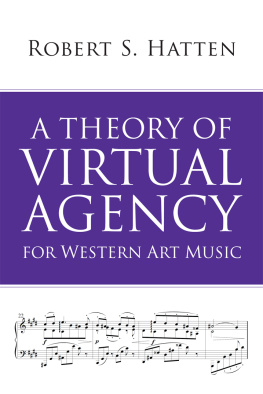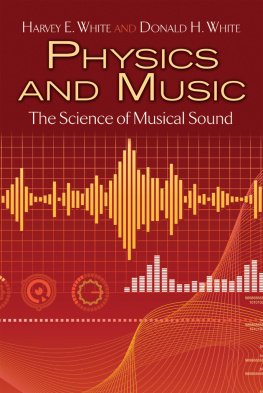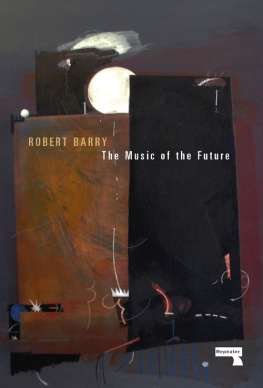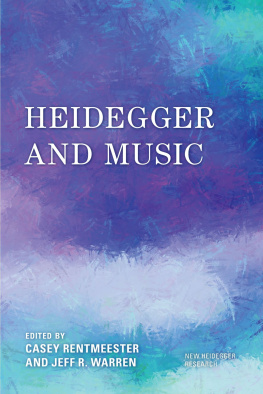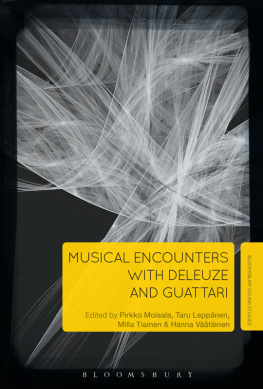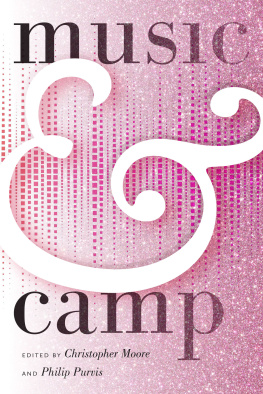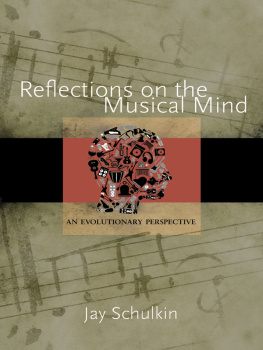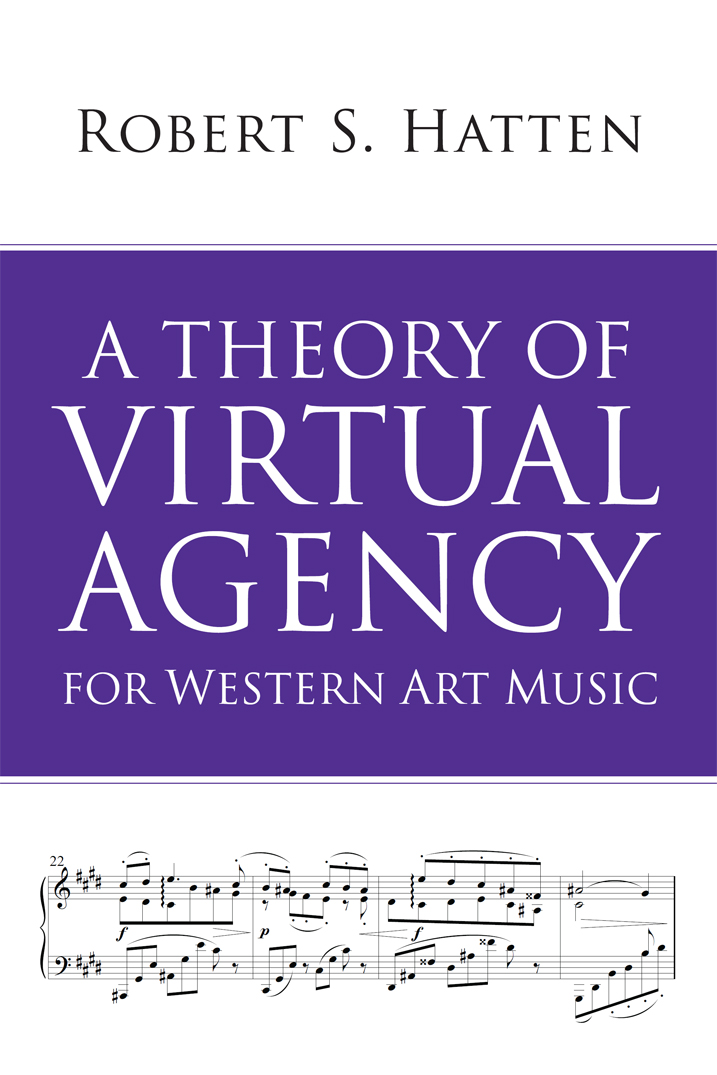Table of Contents
Guide

MUSICAL MEANING AND INTERPRETATION
Robert S. Hatten, editor
This book is a publication of
Indiana University Press
Office of Scholarly Publishing
Herman B Wells Library 350
1320 East 10th Street
Bloomington, Indiana 47405 USA
iupress.indiana.edu
2018 by Robert S. Hatten
All rights reserved
No part of this book may be reproduced or utilized in any form or by any means, electronic or mechanical, including photocopying and recording, or by any information storage and retrieval system, without permission in writing from the publisher.
The paper used in this publication meets the minimum requirements of the American National Standard for Information SciencesPermanence of Paper for Printed Library Materials, ANSI Z39.48-1992.
Manufactured in the United States of America
Library of Congress Cataloging-in-Publication Data
Names: Hatten, Robert S., author.
Title: A theory of virtual agency for Western art music / Robert S. Hatten.
Description: Bloomington : Indiana University Press, 2018. | Series: Musical meaning and interpretation
Identifiers: LCCN 2018021852 (print) | LCCN 2018023643 (ebook) | ISBN 9780253037992 (e-book) | ISBN 9780253037978 (hardback : alk. paper) | ISBN 9780253037985 (pbk. : alk. paper)
Subjects: LCSH: MusicPhilosophy and aesthetics. | Agent (Philosophy) | Act (Philosophy)
Classification: LCC ML3845 (ebook) | LCC ML3845 .H353 2018 (print) | DDC 781.1dc23
LC record available at https://lccn.loc.gov/2018021852
1 2 3 4 5 23 22 21 20 19 18
To Eden, with love
Contents
I begin by thanking Mary Ellen Poole, director of the Butler School of Music, and Douglas Dempster, dean of the College of Fine Arts at the University of Texas, for their continuing support. A Walter and Gina Ducloux Fine Arts Faculty Fellowship funded my faculty leave during fall 2013; it enabled me to begin assembling my earlier work and further developing new ideas on musical agency for this book. I began trying out these ideas through papers at Indiana University and Northwestern in fall 2013, with students in a seminar on virtual agency at Texas in spring 2014, and through a weeklong series of lectures and classes on musical agency at the Krakw Academy of Music in April 2014 (the latter being one of five teaching residencies for which I offer special thanks to Professors Mieczysaw Tomaszewski and Teresa Malecka and one of my assistants, Magorzata Pawowska, along with many other dear colleagues at that institution). I am also grateful for the feedback of countless students and faculty at those institutions and other venues where I gave keynotes or lectures on aspects of my theories of musical agency, including Eero Tarastis International Congresses on Musical Signification, held at academic institutions in Krakw, Louvain-la-Neuve (Costantino Maeder and Mark Reybrouck), and Canterbury (Nicholas McKay); the Durham international conference on music and emotion (Michael Spitzer); the late Schubert conference at Maynooth, Ireland (Lorraine Byrne Bodley and Julian Horton); the Laboratory on Musical Rhetoric at the Boito Conservatory in Parma (Riccardo Ceni, Andrea Padova, and Carlo Lo Presti); the Steve Larson memorial conference at the University of Oregon (Jack Boss and Stephen Rodgers); and the graduate student conference at the University of Arizona (Gabriel Venegas and company), where I also co-directed a student workshop on Romantic form with Boyd Pomeroy. Javier Clavere kindly invited me to give lecture-demonstrations and a master class on the Mozart piano sonatas at Berea College, where he performed the entire cycle. I introduced refractive counterpoint in a special session on musical agency at the 2016 Society for Music Theory conference in Vancouver (Edward Klorman), applied my ideas to twentieth-century repertoire at a special session on analysis at the 2015 meeting of the International Musicological Society in New York (Elliott Antokoletz), and organized sessions with my students on musical agency at conferences of the Semiotic Society of America in Seattle, Pittsburgh, and Puebla, Mexico. I received helpful feedback during a Householder residency at Florida State University and during presentations of invited papers at the following conferences: a narrativity in music conference at Paris and Strasbourg (Mrta Grabcz); the 2016 LangArts conference on gesture in Paris (Vronique Alexandre Journeau); several Beethoven Easter Festival Symposia in Warsaw (with special thanks to Mme. Elbieta Penderecka and Magdalena Chrenkoff); study days on Mozart at the University of Manchester and on performance at the National University of Ireland at Maynooth; and symposia on performance at Princeton and musical meaning at Southern Methodist University. I am further grateful for opportunities to lecture on virtual agency at the Royal Irish Academy of Music in Dublin, the Szymanowski Academy of Music in Katowice, and in the United States at the Eastman School of Music, the University of Michigan, Michigan State University, the University of California at Santa Barbara, Louisiana State University, and the University of Kentucky. Finally, I am deeply appreciative for the Marlene and Morton Meyerson Professorship (beginning in fall 2015) at the Butler School of Music, which supported my research and funded the superb engraving, by David Ferrell, of my musical examples.
Although I cannot begin to name all those who have helped me think through ideas that eventually found their way into this book, I give special thanks to Michael Klein and Michael Spitzer, who read the first complete draft of the manuscript in fall 2016 and offered valuable suggestions, and to David Lidov, Nina Penner, and John Turci-Escobar, who read and gave thoughtful feedback on individual chapters. I also thank two editors of earlier articles, portions of which appear here: Lorraine Byrne Bodley (on late Schubert) and Danuta Mirka (on topic theory).
I am grateful to all my students at Indiana and Texas for their enthusiasm in exploring virtual agency as a key to interpreting musical meaning. It has been a special delight to foster original applications and extensions of this approach in completed dissertations by Michelle Clater on agency in Requiem settings (Indiana), Ian Gerg on the virtual observing agent (Texas), an extensive DMA document on Medtner by Brad Emerson (Texas), recently completed dissertations by Eloise Boisjoli on sensibility in Haydn (Texas), Joel Mott on linearity and agency in Prokofievs war symphonies (Texas), Trina Thompson on the rhetoric of suggestion in Debussy songs (Indiana), and a dissertation in progress by Bree Guerra on musical emotion and enactive theory (Texas).
I thank Janice Frisch, music editor at Indiana University Press, for her wisdom and guidance through the years. She and her production team have helped shepherd this book through its many phases, and I owe them a debt of gratitude not only for my manuscript but for others forthcoming in the Musical Meaning and Interpretation series.
Finally, where would I be without my lovely wife, Eden Davis? I thank her for her love, inspiration, and encouragement, which helped me through the difficult days. This book is dedicated to her.

Situating Virtuality: Virtual and Fictional Agency
Next page
